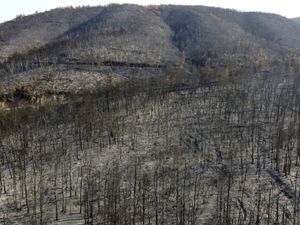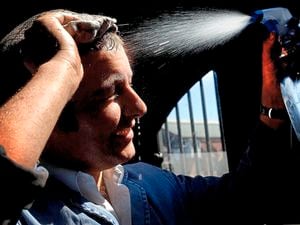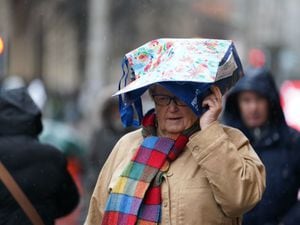West Midlands firefighters working 'as hard as possible' to help bring Greek wildfires under control
Firefighters from the West Midlands are persevering in the international effort to battle wildfires spreading across the Greek countryside.

The group from West Midlands Fire Service (WMFS) had flown out to Athens alongside crews from London, Merseyside, Lancashire and South Wales to assist the Greek authorities in tackling the blazes.
More than 150 homes have been destroyed and villages evacuated as wildfires have spread during the most severe heatwave in Greece in 30 years, with 45C (113F) temperatures and strong winds.
WMFS Watch Commander Shyam Rana, who is serving on his 4th National Deployment, said the team was working as hard as it could to bring the fires under control.
He said: "It's 42 degrees here and at this point, the team of 21 firefighters from across the UK are working really hard.
"What we've been doing is cutting track, dropping trees and damping down hotspots in the sector that has been given to us by the Greek Fire and Rescue service.
"It makes me extremely proud to be a member of a highly trained and highly motivated team that are here to help the most vulnerable people in their time of need.
"We intend to stop here and assist the Greek authorities until I feel we have done everything we can do.
"But until that time, me and my team are going to work as hard as we possibly can to assist with the international effort to bring these wildfires under control."
Hundreds of firefighters from across Europe and the Middle East have continued to work alongside Greek colleagues in rugged terrain to contain flare-ups of the huge wildfires that ravaged Greece's forests for over a week, destroying homes and forcing evacuations.
The fire department said four water-dropping aircraft and six helicopters had been sent to control the new fire in central Evia, along with 23 firefighters and 10 vehicles.
The larger fire that broke out on August 3 destroyed most of the island’s north and is one of the country’s worst known forest fires.
Although wildfires are common in Greece during the hot, dry summers, hundreds of blazes have broken out across the country this year after an especially long and intense heatwave.
Prime Minister Kyriakos Mitsotakis on Thursday described the fires as the greatest ecological disaster Greece has seen in decades.
Several Mediterranean countries have suffered intense heat and quickly spreading wildfires in recent weeks, including Turkey, where at least eight people have died, and Italy.
In Algeria, wildfires in the mountainous Berber region have killed at least 69 people.
Worsening drought and heat – both linked to climate change – have also fuelled wildfires this summer in the western US and in Russia’s northern Siberia region.

Scientists say there is little doubt that climate change from the burning of coal, oil and natural gas is driving more extreme events.
The fires in Greece have stretched the country’s firefighting capabilities to the limit, and the government appealed for help from abroad. Around 24 European and Middle Eastern countries sent aid, including firefighters, aircraft and vehicles.
On Friday, firefighters from Romania, Ukraine, Serbia, Slovakia, Poland and Moldova tended to the smouldering remnants of Evia’s main blaze, which has charred 125,000 acres of Greece’s second-largest island.
Two more major fires are still burning in the southern Greek region of the Peloponnese, where hundreds of French, German, Austrian and Czech firefighters assisted their Greek colleagues.
Evia's rugged, forested northern part, with upland villages and small seaside resorts, has suffered the greatest damage from this month's blazes, with an estimated 123,000 acres lost, together with dozens of homes.
Retiree Maria Roga said that although her house in Evia's village of Pefki was saved at the last moment from flames that burned a neighbouring home, she still worries about flare-ups.
She said: "I'm still afraid. I'm afraid, but I can't complain, I am very grateful, I am one of the lucky ones."
Though most of Pefki's homes are intact, the village, whose name means pine tree, is now surrounded by rank upon rank of blackened trees.





